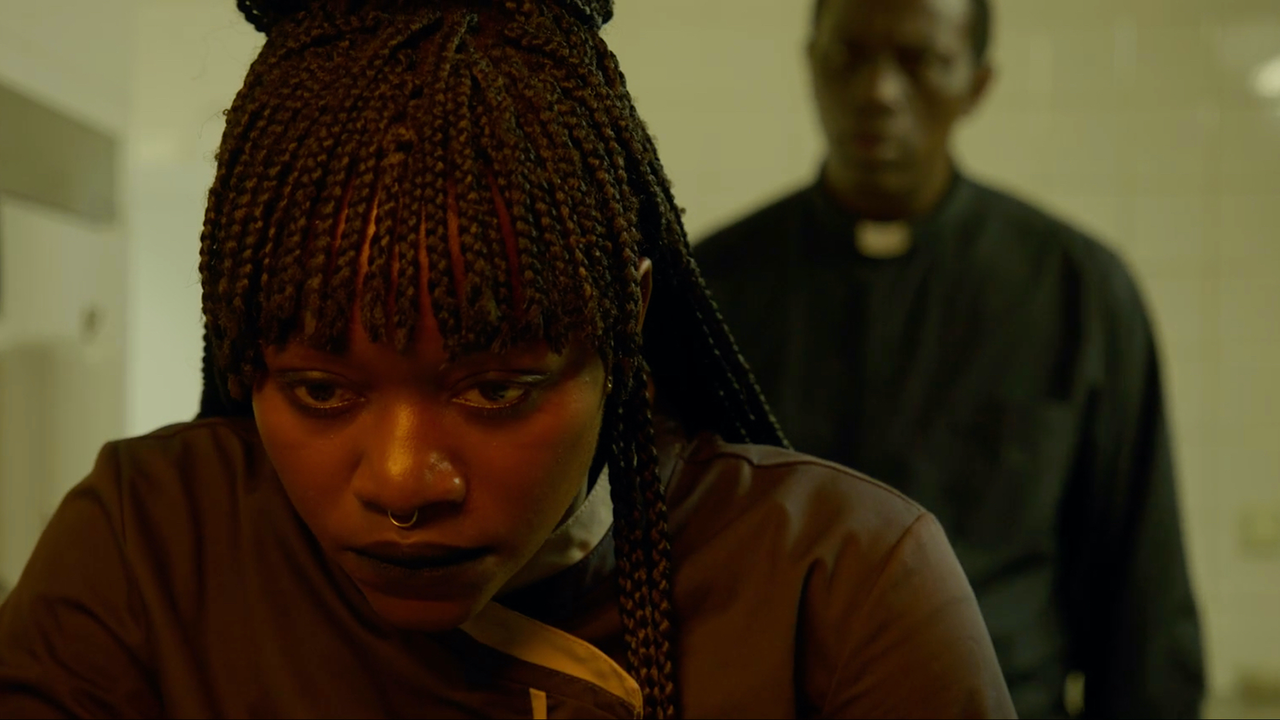Film Review: Our Father, The Devil (2023)

Past events, unseen in the film, drive every moment of Ellie Foumbi’s stunning debut feature, but it’s her character’s refusal to live in the present that makes Our Father, The Devil such a special accomplishment. This is a film in which forgiveness is a long, treacherous road, one that travels first through a no-man’s land of honest self-reflection before trudging through a harsh process of acknowledging complicity in wrongdoing. It gets ugly, and even though it may not offer any clear-cut answers, Our Father, The Devil is nevertheless a film whose questions are well worth asking.
It’s clear from the start that Marie (Babetida Sadjo), a refugee from Africa now living in a small French village, is carrying a weight she doesn’t want others to know about. At a local cafe, as the friendly bartender (Franck Saurel) flirts with her, she remains aloof and unresponsive to his light advances, preferring to sit alone outside with only her reflection to keep her company. At her job as a chef at a high-end retirement home, she’s well-liked and respected by her peers, but she keeps them at arm’s length, save for one wealthy resident whose questions and compliments aren’t as dodged.
If Marie were just a loner, that would be one thing, but she’s clearly troubled by something she refuses to acknowledge. And it’s not as if those in her life don’t try. To her annoyance, her best friend Nadia (Jennifer Tchiakpe) constantly tries to bring her out of her shell, and sometimes even comes close to succeeding. But, without fail, Marie always withdraws back into herself. That is, until one day when a visiting priest takes up residence at her workplace and digs up everything she has worked so hard to bury.
The priest is Father Patrick (Souléymane Sy Savané), but Marie knows him as Sogo, the guerilla leader who, back in Guinea, murdered her family in front of her and then forced her into his cult-like flock. It only takes the sound of Father Patrick’s voice to send Marie into a panic, but it isn’t until she sees him use a distinctive tick while eating his food that she’s sure it truly is Sogo, somehow back from the dead and masquerading as a holy man.
From here, Our Father, The Devil takes on the air of a revenge thriller, but this rather bland descriptor doesn’t do justice to the emotionally charged character study it really is. As Marie and Father Patrick battle wits over his identity, bits of Marie’s past begin to come to light. Over time, her childhood trauma is revealed and confronted, but as the interrogations intensify, her captor’s own victimhood is forced into plain sight as well. These revelations thrust a philosophical quandary on Marie that sends her anger careening down paths she never envisioned, and forces her to examine her own actions and involvement in the trauma of others. As I said, it gets ugly, but somewhere inside all this reprehensible behavior lies a way out, if only Marie can find it.
None of this works without powerhouse performances from both Sadjo and Savané. The intensity of their relationship drips with stress and anxiety, so much so that, even in scenes when they are apart, the specter of their ordeal hangs over every frame like the sword of Damocles. Foumbi might make some rookie mistakes with timing and pacing, but the sweaty, violent tension she creates between her two leads is not something easily forgotten. Her keen eye and striking style will not only compel viewers to creep forward in their seats and take notice, but they will also breathe a sigh of relief when the hostilities come to a satisfying, if oblique, conclusion.

